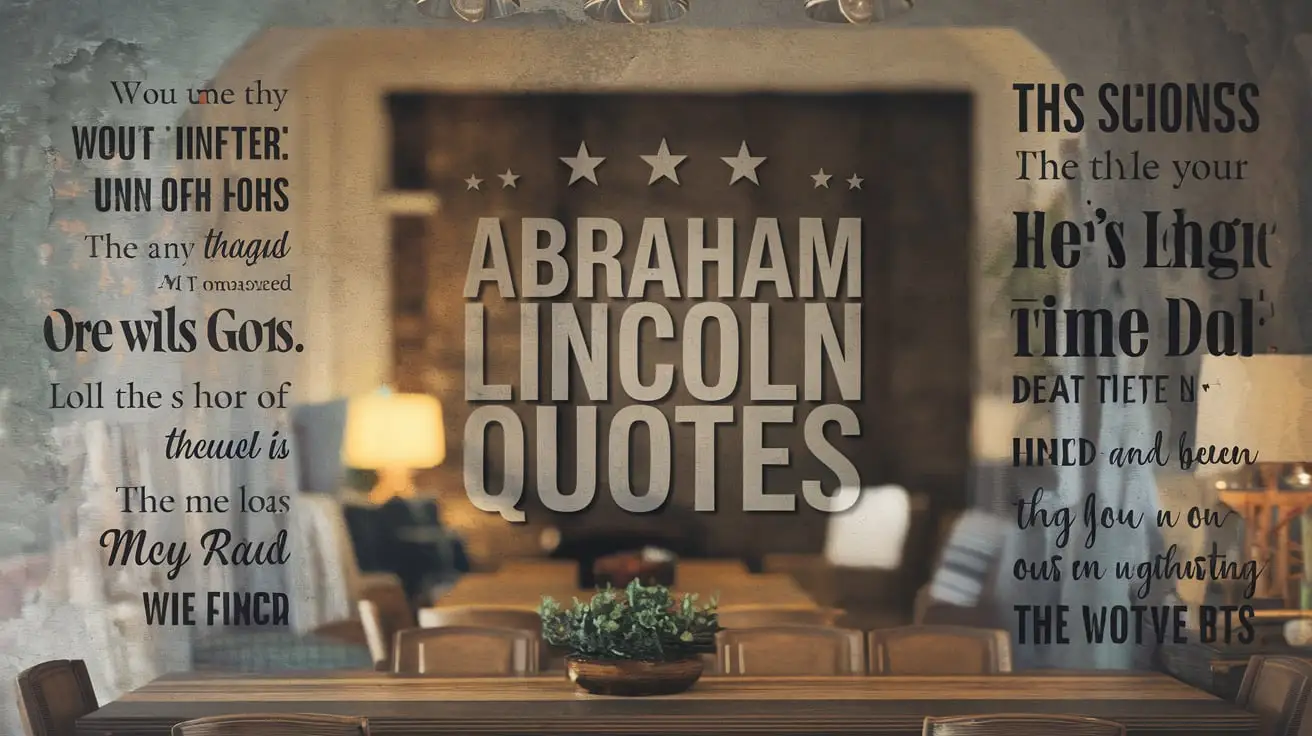Abraham Lincoln, the 16th President of the United States, is one of history’s most revered leaders known for his wisdom, humility, and perseverance. Abraham Lincoln Quotes offer insights into leadership, personal responsibility, justice, and the human spirit’s resilience.
In this collection, we explore Lincoln’s most impactful quotes, each accompanied by a brief description to provide context and deeper understanding. These quotes not only reflect his values and beliefs but also offer timeless advice that remains relevant in today’s world.
On Democracy and Governance
“The ballot is stronger than the bullet.”
Author: Abraham Lincoln
Description:
Lincoln underscores the power of democratic processes over violence. He believes voting and civic participation are more effective in achieving lasting change than force.
“Government of the people, by the people, for the people, shall not perish from the Earth.”
Author: Abraham Lincoln
Description:
This famous quote from the Gettysburg Address emphasizes the importance of a government representing and serving its citizens. It’s a declaration of democratic ideals.
“Public sentiment is everything. With public sentiment, nothing can fail; without it, nothing can succeed.”
Author: Abraham Lincoln
Description:
Lincoln highlights the influence of public opinion on governance. He suggests that the success of policies and leadership depends on the support of the people.
“The people will save their government if the government itself will allow them.”
Author: Abraham Lincoln
Description:
Lincoln expresses his faith in the power of the people to preserve democracy. He implies that a government should not obstruct the will of its citizens.
“As I would not be a slave, so I would not be a master. This expresses my idea of democracy.”
Author: Abraham Lincoln
Description:
Lincoln defines democracy as a system that rejects both oppression and dominance. It’s a statement of equality and fairness for all.
“The best way to get a bad law repealed is to enforce it strictly.”
Author: Abraham Lincoln
Description:
Lincoln suggests that the quickest way to highlight the flaws of an unjust law is through strict enforcement. This quote reflects his belief in justice and reform.
“Let us have faith that right makes might, and in that faith, let us, to the end, dare to do our duty as we understand it.”
Author: Abraham Lincoln
Description:
Lincoln emphasizes the importance of moral conviction in governance. He believes that righteousness, not just power, should guide actions and decisions.
“I am not a party man first; I am a countryman first.”
Author: Abraham Lincoln
Description:
Lincoln emphasizes his commitment to the nation above partisan politics. This quote reflects his dedication to the greater good over political allegiance.
“A house divided against itself cannot stand.”
Author: Abraham Lincoln
Description:
In his famous speech, Lincoln argues that a nation split by internal conflicts cannot endure. This quote reflects his concern for the unity and stability of the country.
“The strongest link in the chain of our liberty is the principle that the people are the source of all power.”
Author: Abraham Lincoln
Description:
Lincoln emphasizes the fundamental role of the people in maintaining democracy. He believes that popular sovereignty is essential for a free society.
On War and Peace
“In great contests, each party claims to act by the will of God. Both may be, and one must be, wrong.”
Author: Abraham Lincoln
Description:
Lincoln reflects on the moral ambiguity of war. He suggests that both sides often believe they are righteous, but only one can truly be aligned with justice.
“The dogmas of the quiet past are inadequate to the stormy present.”
Author: Abraham Lincoln
Description:
Lincoln highlights the need for new thinking in times of crisis. He suggests that past solutions may not be sufficient for current challenges, especially in the context of war.
“With malice toward none, with charity for all…let us strive on to finish the work we are in, to bind up the nation’s wounds.”
Author: Abraham Lincoln
Description:
From his second inaugural address, Lincoln calls for reconciliation and healing after the Civil War. He advocates for compassion and unity in the aftermath of conflict.
“I would rather be a little nobody than to be an evil somebody.”
Author: Abraham Lincoln
Description:
Lincoln expresses his preference for humility and moral integrity over fame or power, especially in the context of wartime decisions.
“I do not like that man. I must get to know him better.”
Author: Abraham Lincoln
Description:
Lincoln suggests that understanding and empathy are crucial, even with those we may initially dislike. It’s a call to seek peace and connection rather than conflict.
“The best way to destroy an enemy is to make him a friend.”
Author: Abraham Lincoln
Description:
Lincoln advocates for reconciliation over continued conflict. He believes that converting enemies into allies is the most effective way to ensure peace.
“The world will little note, nor long remember what we say here, but it can never forget what they did here.”
Author: Abraham Lincoln
Description:
In the Gettysburg Address, Lincoln acknowledges that words might fade, but actions and sacrifices are remembered. It underscores the enduring impact of deeds over rhetoric.
“It is not the years in your life that count. It’s the life in your years.”
Author: Abraham Lincoln
Description:
Lincoln emphasizes the quality of life over its duration. He suggests that the richness of one’s experiences is more important than the number of years lived.
“The way for a man to rise is to improve himself.”
Author: Abraham Lincoln
Description:
Lincoln advises self-improvement as a path to personal growth and success. He believes that individual advancement comes from bettering oneself.
“The best way to predict your future is to create it.”
Author: Abraham Lincoln
Description:
Lincoln encourages proactive action in shaping one’s destiny. He advocates for taking control of the future through deliberate and thoughtful efforts.
On Liberty and Justice
“Those who deny freedom to others deserve it not for themselves.”
Author: Abraham Lincoln
Description:
Lincoln makes a powerful statement on the universal right to freedom. He argues that anyone who would strip others of their liberty is unworthy of their own.
“In giving freedom to the slave, we assure freedom to the free.”
Author: Abraham Lincoln
Description:
Lincoln suggests that the act of emancipating slaves reinforces the principles of liberty for all. By securing freedom for others, society strengthens its values.
“All men are created equal.”
Author: Abraham Lincoln
Description:
Lincoln reiterates the foundational American belief in equality. He advocates for a society where everyone, regardless of background, has the same inherent rights.
“Let us have faith that right makes might.”
Author: Abraham Lincoln
Description:
Lincoln encourages confidence in the power of justice. He believes that moral righteousness is ultimately stronger than physical or political power.
“I am naturally anti-slavery. If slavery is not wrong, nothing is wrong.”
Author: Abraham Lincoln
Description:
Lincoln clearly states his opposition to slavery. He considers it an absolute moral wrong, and this quote reflects his deep commitment to abolition.
“It is for us the living, rather, to be dedicated here to the unfinished work which they who fought here have thus far so nobly advanced.”
Author: Abraham Lincoln
Description:
From the Gettysburg Address, Lincoln urges the living to continue the fight for freedom and justice, honoring those who sacrificed for these principles.
“No man is good enough to govern another man without the other’s consent.”
Author: Abraham Lincoln
Description:
Lincoln argues against tyranny and oppression. He believes that legitimate governance requires the consent of the governed, reinforcing the principles of democracy.
“The law of the land is no more than the voice of the people.”
Author: Abraham Lincoln
Description:
Lincoln emphasizes that laws should reflect the will of the people. He believes that legal authority comes from public consent.
“The probability that we may fail in the struggle ought not to deter us from the support of a cause we believe to be just.”
Author: Abraham Lincoln
Description:
Lincoln advises courage in the face of potential failure. He argues that commitment to a just cause is worth the risk, even if success isn’t guaranteed.
“A man is not old until his regrets take the place of his dreams.”
Author: Abraham Lincoln
Description:
Lincoln suggests that aging is marked by the loss of hope and ambition. He believes that as long as dreams remain, one’s spirit stays youthful.
On Integrity
“I am not bound to win, but I am bound to be true.”
Author: Abraham Lincoln
Description:
Lincoln places greater value on integrity than on victory. He believes that staying true to one’s principles is more important than achieving success at any cost.
“No man has a good enough memory to be a successful liar.”
Author: Abraham Lincoln
Description:
Lincoln points out the difficulties of maintaining deceit. He suggests that honesty is more practical and sustainable than dishonesty.
“When I do good, I feel good. When I do bad, I feel bad. That’s my religion.”
Author: Abraham Lincoln
Description:
Lincoln offers a simple moral philosophy based on personal accountability. He believes that ethical behavior naturally leads to positive feelings.
“The best thing about the future is that it comes one day at a time.”
Author: Abraham Lincoln
Description:
Lincoln encourages focusing on the present and handling challenges step by step. This quote reflects his pragmatic approach to life.
“I would rather be a little nobody than to be an evil somebody.”
Author: Abraham Lincoln
Description:
Lincoln expresses his preference for humility and moral integrity over fame or power. He values goodness over recognition.
“I walk slowly, but I never walk backward.”
Author: Abraham Lincoln
Description:
Lincoln highlights his commitment to progress and persistence. He emphasizes the importance of moving forward, even at a slow pace, rather than retreating.
“It is better to be silent and be thought a fool than to speak and remove all doubt.”
Author: Abraham Lincoln
Description:
Lincoln advises caution in speech, suggesting that sometimes silence is wiser than speaking without careful thought. This quote reflects his value for thoughtful communication.
“The more I am around people, the more I am aware of my ignorance.”
Author: Abraham Lincoln
Description:
Lincoln reflects on humility and the continuous pursuit of knowledge. He acknowledges that interacting with others highlights his limitations and areas for growth.
“He has a right to criticize who has a heart to help.”
Author: Abraham Lincoln
Description:
Lincoln emphasizes that criticism should come from those who are willing to contribute constructively. He values helpfulness alongside critique.
“The best way to predict your future is to create it.”
Author: Abraham Lincoln
Description:
Lincoln encourages proactive action in shaping one’s destiny. He advocates for taking control of the future through deliberate and thoughtful efforts.
On Leadership
“I have never had a policy; I have just tried to do my very best every day.”
Author: Abraham Lincoln
Description:
Lincoln reflects on his leadership style. He emphasizes diligence and daily effort over rigid policies or plans.
“You cannot escape the responsibility of tomorrow by evading it today.”
Author: Abraham Lincoln
Description:
Lincoln stresses the importance of addressing responsibilities promptly. He believes that avoiding challenges only postpones their resolution.
“The best way to get a bad law repealed is to enforce it strictly.”
Author: Abraham Lincoln
Description:
Lincoln suggests that the quickest way to highlight the flaws of an unjust law is through strict enforcement. This quote reflects his belief in justice and reform.
“I am a firm believer in the people. If given the truth, they can be depended upon to meet any national crisis.”
Author: Abraham Lincoln
Description:
Lincoln trusts the people’s ability to handle crises if they are informed. He values transparency and public trust.
“The way for a man to rise is to improve himself.”
Author: Abraham Lincoln
Description:
Lincoln advises self-improvement as a path to personal growth and success. He believes that individual advancement comes from bettering oneself.
“The only way to deal with an unfree world is to become so absolutely free that your very existence is an act of rebellion.”
Author: Abraham Lincoln
Description:
Lincoln advocates for personal freedom as a form of resistance against oppression. He suggests that living freely can challenge and undermine unfreedom.
“The greatest fine art of the future will be the making of a comfortable living from a small piece of land.”
Author: Abraham Lincoln
Description:
Lincoln praises the art of simple, self-sufficient living. He sees value in creating comfort and stability from modest resources.
“It is not the years in your life that count. It’s the life in your years.”
Author: Abraham Lincoln
Description:
Lincoln emphasizes the quality of life over its duration. He suggests that the richness of one’s experiences is more important than the number of years lived.
“I do the best I can, and that’s all I can do.”
Author: Abraham Lincoln
Description:
Lincoln expresses a humble approach to challenges. He emphasizes doing one’s best without expecting perfection or control over outcomes.
“The more I am around people, the more I am aware of my ignorance.”
Author: Abraham Lincoln
Description:
Lincoln reflects on humility and the continuous pursuit of knowledge. He acknowledges that interacting with others highlights his limitations and areas for growth.
On Perseverance
“The only way to deal with an unfree world is to become so absolutely free that your very existence is an act of rebellion.”
Author: Abraham Lincoln
Description:
Lincoln advocates for personal freedom as a form of resistance against oppression. He suggests that living freely can challenge and undermine unfreedom.
“I never had a policy; I have just tried to do my very best every day.”
Author: Abraham Lincoln
Description:
Lincoln reflects on his approach to leadership. He emphasizes diligence and daily effort over rigid policies or plans.
“I do the best I can, and that’s all I can do.”
Author: Abraham Lincoln
Description:
Lincoln expresses a humble approach to challenges. He emphasizes doing one’s best without expecting perfection or control over outcomes.
“The strongest man is the one who stands alone.”
Author: Abraham Lincoln
Description:
Lincoln suggests that true strength is demonstrated through independence and self-reliance. This quote reflects his belief in individual resilience.
“I am a firm believer in the people. If given the truth, they can be depended upon to meet any national crisis.”
Author: Abraham Lincoln
Description:
Lincoln trusts the people’s ability to handle crises if they are informed. He values transparency and public trust.
“He has a right to criticize who has a heart to help.”
Author: Abraham Lincoln
Description:
Lincoln emphasizes that criticism should come from those who are willing to contribute constructively. He values helpfulness alongside critique.
“The best way to predict your future is to create it.”
Author: Abraham Lincoln
Description:
Lincoln encourages proactive action in shaping one’s destiny. He advocates for taking control of the future through deliberate and thoughtful efforts.
“It is not the years in your life that count. It’s the life in your years.”
Author: Abraham Lincoln
Description:
Lincoln emphasizes the quality of life over its duration. He suggests that the richness of one’s experiences is more important than the number of years lived.
“I walk slowly, but I never walk backward.”
Author: Abraham Lincoln
Description:
Lincoln highlights his commitment to progress and persistence. He emphasizes the importance of moving forward, even at a slow pace, rather than retreating.
“The more I am around people, the more I am aware of my ignorance.”
Author: Abraham Lincoln
Description:
Lincoln reflects on humility and the continuous pursuit of knowledge. He acknowledges that interacting with others highlights his limitations and areas for growth.
On Wisdom and Knowledge
“The philosophy of the schoolroom in one generation will be the philosophy of government in the next.”
Author: Abraham Lincoln
Description:
Lincoln underscores the impact of education on future governance. He believes that the values imparted in schools will shape future leadership.
“Give me six hours to chop down a tree and I will spend the first four sharpening the axe.”
Author: Abraham Lincoln
Description:
Lincoln highlights the importance of preparation and skill. He suggests that thorough preparation is key to success, even in seemingly straightforward tasks.
“I don’t think much of a man who is not wiser today than he was yesterday.”
Author: Abraham Lincoln
Description:
Lincoln values continuous learning and personal growth. He believes that wisdom comes from improving oneself daily.
“You can fool all the people some of the time, and some of the people all the time, but you cannot fool all the people all the time.”
Author: Abraham Lincoln
Description:
Lincoln reflects on the limits of deception. He suggests that while lies may work temporarily, the truth will ultimately prevail.
“I am a firm believer in the people. If given the truth, they can be depended upon to meet any national crisis. The great point is to bring them the real facts.”
Author: Abraham Lincoln
Description:
Lincoln emphasizes the importance of truth and transparency, especially during times of crisis. He believes that an informed populace can be trusted to handle challenges wisely.
“Character is like a tree and reputation like a shadow. The shadow is what we think of it; the tree is the real thing.”
Author: Abraham Lincoln
Description:
Lincoln distinguishes between appearance and reality. He suggests that true character, like a tree, is solid and enduring, while reputation is merely a reflection.
“The best way to predict your future is to create it.”
Author: Abraham Lincoln
Description:
Lincoln encourages proactive action in shaping one’s destiny. He advocates for taking control of the future through deliberate and thoughtful efforts.
“The only way to deal with an unfree world is to become so absolutely free that your very existence is an act of rebellion.”
Author: Abraham Lincoln
Description:
Lincoln advocates for personal freedom as a form of resistance against oppression. He suggests that living freely can challenge and undermine unfreedom.
“The greatest fine art of the future will be the making of a comfortable living from a small piece of land.”
Author: Abraham Lincoln
Description:
Lincoln praises the art of simple, self-sufficient living. He sees value in creating comfort and stability from modest resources.
“It is not the years in your life that count. It’s the life in your years.”
Author: Abraham Lincoln
Description:
Lincoln emphasizes the quality of life over its duration. He suggests that the richness of one’s experiences is more important than the number of years lived.
On Humility
“I would rather be a little nobody than to be an evil somebody.”
Author: Abraham Lincoln
Description:
Lincoln expresses his preference for humility and moral integrity over fame or power. He values goodness over recognition.
“I am not concerned that you have fallen I am concerned that you arise.”
Author: Abraham Lincoln
Description:
Lincoln emphasizes the importance of resilience. He believes that recovery from setbacks is more significant than the fact of having failed.
“I walk slowly, but I never walk backward.”
Author: Abraham Lincoln
Description:
Lincoln highlights his commitment to progress and persistence. He emphasizes the importance of moving forward, even at a slow pace, rather than retreating.
“It is better to be silent and be thought a fool than to speak and remove all doubt.”
Author: Abraham Lincoln
Description:
Lincoln advises caution in speech, suggesting that sometimes silence is wiser than speaking without careful thought. This quote reflects his value for thoughtful communication.
“The best way to get a bad law repealed is to enforce it strictly.”
Author: Abraham Lincoln
Description:
Lincoln suggests that the quickest way to highlight the flaws of an unjust law is through strict enforcement. This quote reflects his belief in justice and reform.
“I am not bound to win, but I am bound to be true.”
Author: Abraham Lincoln
Description:
Lincoln places greater value on integrity than on victory. He believes that staying true to one’s principles is more important than achieving success at any cost.
“The best way to predict your future is to create it.”
Author: Abraham Lincoln
Description:
Lincoln encourages proactive action in shaping one’s destiny. He advocates for taking control of the future through deliberate and thoughtful efforts.
“The more I am around people, the more I am aware of my ignorance.”
Author: Abraham Lincoln
Description:
Lincoln reflects on humility and the continuous pursuit of knowledge. He acknowledges that interacting with others highlights his limitations and areas for growth.
“Character is like a tree and reputation like a shadow. The shadow is what we think of it; the tree is the real thing.”
Author: Abraham Lincoln
Description:
Lincoln distinguishes between appearance and reality. He suggests that true character, like a tree, is solid and enduring, while reputation is merely a reflection.
“It is not the years in your life that count. It’s the life in your years.”
Author: Abraham Lincoln
Description:
Lincoln emphasizes the quality of life over its duration. He suggests that the richness of one’s experiences is more important than the number of years lived.
On Personal Responsibility
“The best way to predict your future is to create it.”
Author: Abraham Lincoln
Description:
Lincoln encourages taking proactive steps to shape one’s future. He believes that individuals have the power to determine their destinies.
“The only way to deal with an unfree world is to become so absolutely free that your very existence is an act of rebellion.”
Author: Abraham Lincoln
Description:
Lincoln advocates for personal freedom as a form of resistance against oppression. He suggests that living freely can challenge and undermine unfreedom.
“I am a firm believer in the people. If given the truth, they can be depended upon to meet any national crisis. The great point is to bring them the real facts.”
Author: Abraham Lincoln
Description:
Lincoln emphasizes the importance of truth and transparency, especially during times of crisis. He believes that an informed populace can handle challenges wisely.
“It is not the years in your life that count. It’s the life in your years.”
Author: Abraham Lincoln
Description:
Lincoln emphasizes the quality of life over its duration. He suggests that the richness of one’s experiences is more important than the number of years lived.
“The way for a man to rise is to improve himself.”
Author: Abraham Lincoln
Description:
Lincoln advises self-improvement as a path to personal growth and success. He believes that individual advancement comes from bettering oneself.
“I do the best I can, and that’s all I can do.”
Author: Abraham Lincoln
Description:
Lincoln expresses a humble approach to challenges. He emphasizes doing one’s best without expecting perfection or control over outcomes.
“The strongest man is the one who stands alone.”
Author: Abraham Lincoln
Description:
Lincoln suggests that true strength is demonstrated through independence and self-reliance. This quote reflects his belief in individual resilience.
“The more I am around people, the more I am aware of my ignorance.”
Author: Abraham Lincoln
Description:
Lincoln reflects on humility and the continuous pursuit of knowledge. He acknowledges that interacting with others highlights his limitations and areas for growth.
“He has a right to criticize who has a heart to help.”
Author: Abraham Lincoln
Description:
Lincoln emphasizes that criticism should come from those who are willing to contribute constructively. He values helpfulness alongside critique.
“The best way to get a bad law repealed is to enforce it strictly.”
Author: Abraham Lincoln
Description:
Lincoln suggests that the quickest way to highlight the flaws of an unjust law is through strict enforcement. This quote reflects his belief in justice and reform.
On Leadership and Legacy
“I have never had a policy; I have just tried to do my very best every day.”
Author: Abraham Lincoln
Description:
Lincoln reflects on his approach to leadership. He emphasizes diligence and daily effort over rigid policies or plans.
“You cannot escape the responsibility of tomorrow by evading it today.”
Author: Abraham Lincoln
Description:
Lincoln stresses the importance of addressing responsibilities promptly. He believes that avoiding challenges only postpones their resolution.
“The best way to predict your future is to create it.”
Author: Abraham Lincoln
Description:
Lincoln encourages proactive action in shaping one’s destiny. He advocates for taking control of the future through deliberate and thoughtful efforts.
“I am a firm believer in the people. If given the truth, they can be depended upon to meet any national crisis. The great point is to bring them the real facts.”
Author: Abraham Lincoln
Description:
Lincoln emphasizes the importance of truth and transparency, especially during times of crisis. He believes that an informed populace can handle challenges wisely.
“The best way to get a bad law repealed is to enforce it strictly.”
Author: Abraham Lincoln
Description:
Lincoln suggests that the quickest way to highlight the flaws of an unjust law is through strict enforcement. This quote reflects his belief in justice and reform.
“I am not bound to win, but I am bound to be true.”
Author: Abraham Lincoln
Description:
Lincoln places greater value on integrity than on victory. He believes that staying true to one’s principles is more important than achieving success at any cost.
“The way for a man to rise is to improve himself.”
Author: Abraham Lincoln
Description:
Lincoln advises self-improvement as a path to personal growth and success. He believes that individual advancement comes from bettering oneself.
“The greatest fine art of the future will be the making of a comfortable living from a small piece of land.”
Author: Abraham Lincoln
Description:
Lincoln praises the art of simple, self-sufficient living. He sees value in creating comfort and stability from modest resources.
“Character is like a tree and reputation like a shadow. The shadow is what we think of it; the tree is the real thing.”
Author: Abraham Lincoln
Description:
Lincoln distinguishes between appearance and reality. He suggests that true character, like a tree, is solid and enduring, while reputation is merely a reflection.
“The more I am around people, the more I am aware of my ignorance.”
Author: Abraham Lincoln
Description:
Lincoln reflects on humility and the continuous pursuit of knowledge. He acknowledges that interacting with others highlights his limitations and areas for growth.










